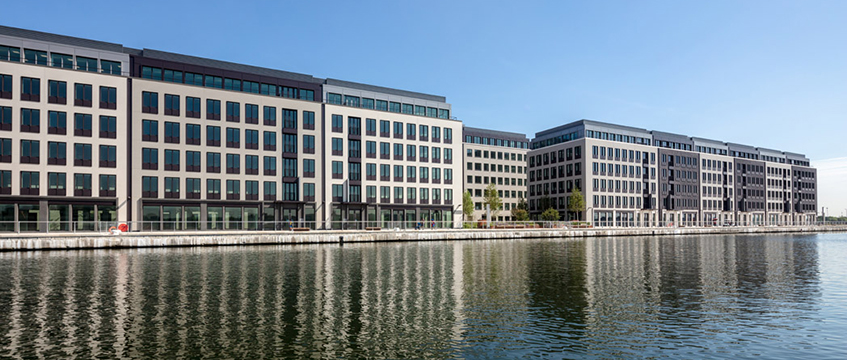ABP’s boss unveils micro office ‘cubes’ at Royal Albert Dock
It has been a turbulent time for ABP’s £1.7bn Royal Albert Dock scheme, which has been weighed down by Covid-19, Brexit woes and the Chinese government’s shifting stance on overseas investment.
Xu Weiping, chairman of ABP, candidly tells EG that the 35-acre project has had “its ups and downs”. He admits some investors and committed occupiers have been getting cold feet as each political and economic situation unfolds.
However Xu is planning to turn its fortunes around, starting with a fresh take on the flexible serviced office: single-person, micro office “cubes”.
It has been a turbulent time for ABP’s £1.7bn Royal Albert Dock scheme, which has been weighed down by Covid-19, Brexit woes and the Chinese government’s shifting stance on overseas investment.
Xu Weiping, chairman of ABP, candidly tells EG that the 35-acre project has had “its ups and downs”. He admits some investors and committed occupiers have been getting cold feet as each political and economic situation unfolds.
However Xu is planning to turn its fortunes around, starting with a fresh take on the flexible serviced office: single-person, micro office “cubes”.
The developer plans to spend £20m on building studios in cubes measuring 32.3 sq ft by 32.3 sq ft, across the 630,000 sq ft that it has already built as part of the scheme’s first phase. Each studio in the initiative, called the Cube, is expected to cost less than £700 per month to rent.
Floors will be divided into 20 studios, with 2,000 released to the market in September.
The aim is to appeal to occupiers that enjoy the benefits of home working but need to operate within an office community for business networking, or access to facilities such as meeting rooms.
Although in the final design stages, each will comprise a sliding glass door, window for natural light, window blinds and a low roof. These will be soundproofed and air-conditioned, and equipped with a mini-fridge, microwave, video equipment, small sink and an office chair and day bed inside. Customisable options will also be available.
On each floor in each building shower and changing rooms will also be provided, while further facilities such as dining space, meeting room, broadcast rooms, laundry space and cafes will be provided.
“We can confidently say that the facilities to be offered will be better than some of the VIP lounge rooms offered by airlines,” Xu says.
ABP will also create an online platform for its members, which will provide networking events, entrepreneur and investor clubs, as well as online courses and access to business advice and support. It will also offer discounts at shops, cafes, restaurants and gyms.
The platform, called A-Hub, will provide access to connected online portals covering art, graduate entrepreneurship, international talent projects, media and influencers, as well as HR and IT services.
Strategy overhaul
The developer has launched these initiatives in a bid to adapt to the changing office environment, brought about by the pandemic. Political uncertainty also prompted the rethink around its commercial offering.
Xu admits that the unresolved issue of Brexit and the ongoing confusion around it has given “many investors, especially investors from China and the wider Asian area, doubts concerning the project as well as the general investment environment in the UK”.
He says: “A lot of our potential clients who had already committed to the occupancy of our office buildings are having doubts, and some have decided not to proceed and have even been willing to give up their deposits because they were not willing to take further risks with the uncertainty brought by Brexit. So this has indeed created difficulties and pressure for ABP.”
Some of these potential occupiers included German Pool, New Zhong Yuen Group, CDL Group and China Insurance Consultants, a subsidiary of China Taiping Insurance, as reported by EG in 2015.
Xu adds that the pandemic has exacerbated these views as well as aversion to risk from investors.
Meanwhile, the “change in attitude” of the Chinese government since 2013, when ABP signed its development agreement with the Greater London Authority for Royal Albert Dock, has also had an impact.
But Xu is upbeat that China will continue with its long-term strategy of opening up to the rest of the world, and that its current stance is a temporary adjustment.
Xu, who has been in the UK since Christmas due to lockdowns in China, Hong Kong and then the UK, has stayed confident in London’s attractiveness to investors despite the combination of “negative factors” facing the scheme.
He flags the potential relocation of the GLA to nearby Royal Victoria Dock as a positive factor that will “bring more vitality and footfall” to the area if it progresses. He believes that like the GLA, which is debating relocating to save more than £30m over five years, other businesses will be reassessing their office space costs and its move could encourage others to follow suit.
The developer will also continue to lease space outside of the Cube, with rental prices at £40 per sq ft, and sell 180-year long leaseholds over the buildings with price per sq ft at £517 GIA.
Still to come
ABP is now focusing on populating its commercial-focused £300m first phase with tenants. This includes ongoing discussions with venture capital firm Pontaq, which is slated to take 10,000 sq ft.
Taiwanese tech firm Advantech’s UK arm has also signed a deal in March to relocate its operations to one of the scheme’s 20 office townhouses.
The scheme has a second phase, comprising a hotel, serviced apartments and more commercial space, which has yet to be built. It is so far unfunded, although Mr Xu expects to arrange financing by the end of next year.
Xu points to interest from several investors, and says that ABP is also considering partnering with fund managers and international developers to deliver this second phase.
“We aim to do a better job than in phase one,” he adds.
Funding for the development was originally sourced from Chinese firm CITIC, which paid £100m for a 20% stake in the scheme in 2015, while Bank of China, Agricultural Bank of China, Industrial and Commercial Bank of China and China Construction Bank Corporation agreed to provide a 60% senior loan for phase one.
ABP also secured financing from Thailand’s Charoen Pokphand Group, which had signed a deal at the end of 2016 to provide a further £425m in equity. However, the developer has since confirmed that Charoen Pokphand is no longer involved in the scheme.
Singapore-based Strawberry Star has exchanged contracts to acquire five buildings at the project for more than £60m, and ABP is working on the first completion on this.
Selling phase two as a development opportunity could be on the cards too. “Everything is possible,” Xu says. “We would never want to say never.”
Photo © Simon Kennedy
To send feedback, e-mail louise.dransfield@egi.co.uk or tweet @DransfieldL or @estatesgazette











